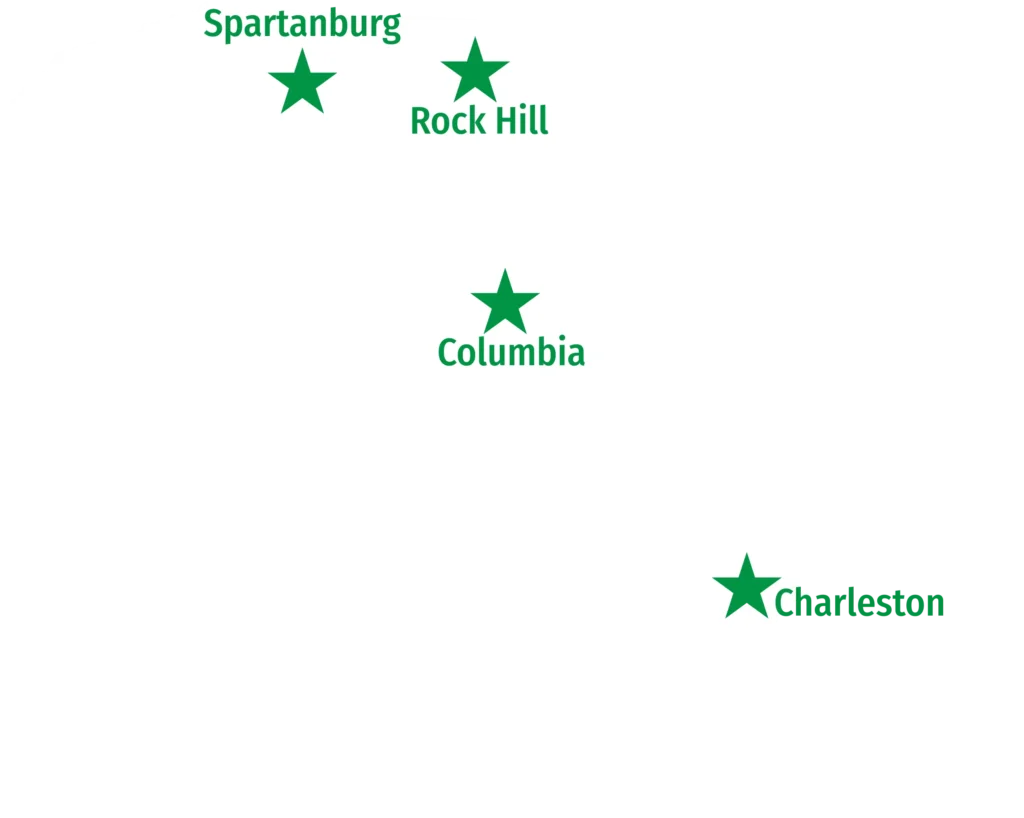If you are looking for rehabs in South Carolina and need help with drug and alcohol addiction – call (704) 248-8561.

South Carolina is known as the Palmetto State – named for the state tree, the palmetto. With flowering yellow jessamine as far as the eye can see and the Carolina Wren soaring high overhead, South Carolina’s beauty is breathtaking – bringing in thousands of tourists each year. Even with the beautiful landscape and rich history, South Carolina residents are still facing struggles with addiction and mental health disorders. These disorders include depression, anxiety, bipolar disorder, post-traumatic stress disorder (PTSD), and drug and alcohol addictions.
There are a variety of substance abuse treatment options available in South Carolina for anyone looking to overcome their struggles with drug and alcohol addiction. This South Carolina recovery center treatment guide for drug and alcohol addiction offers guidance, community-based support, recovery program opportunities, and more, to help achieve long-term sobriety.
In South Carolina, there are a variety of drug and alcohol treatment services available. These programs are tailored to meet the unique needs of individuals, providing personalized plans to achieve long-term sobriety. Here’s a closer look at the different types of services offered:

Choosing a drug treatment center in South Carolina is a crucial decision that requires careful consideration. Several factors should be taken into account to ensure that the chosen facility aligns with the individual’s needs and provides comprehensive support for recovery.
Here are ten key considerations:
1. Treatment Approach:
Different treatment centers employ various approaches to addiction treatment, including medical detox, therapy, counseling, and holistic therapies. It’s essential to understand the treatment modalities offered by each center and determine whether they align with personal preferences and needs.
2. Accreditation and Licensing:
Verify that the treatment center is accredited by reputable organizations such as the Joint Commission or the Commission on Accreditation of Rehabilitation Facilities (CARF). Accreditation ensures that the facility meets quality standards and adheres to best practices in addiction treatment. Additionally, ensure that the facility and its staff hold the necessary licenses and certifications required by South Carolina state regulations.
3. Specialized Programs:
Some individuals may have specific needs or preferences regarding treatment, such as dual diagnosis treatment for co-occurring mental health disorders or gender-specific programs. Consider whether the treatment center offers specialized programs tailored to these needs.
4. Staff Credentials and Experience:
Research the qualifications and experience of the treatment center’s staff, including therapists, counselors, and medical professionals. Ensure that they have the expertise and training necessary to provide effective addiction treatment and support.
5. Continuum of Care:
Recovery from addiction is a long-term process that requires ongoing support and aftercare. Evaluate whether the treatment center offers a continuum of care, including follow-up services, support groups, and resources for transitioning back into daily life after treatment.
6. Amenities and Facilities:
Consider the amenities and facilities available at the treatment center, such as comfortable accommodations, recreational activities, and wellness amenities. While these may not be the primary focus of treatment, they can contribute to the overall experience and comfort of the individual during their stay.
7. Location and Environment:
The location and environment of the treatment center can play a significant role in the individual’s recovery journey. Some individuals may prefer a facility located in a serene and secluded setting, while others may prefer a more urban environment. Consider whether the location and surroundings align with the individual’s preferences and needs.
8. Cost and Insurance Coverage:
Addiction treatment can be costly, so it’s essential to consider the cost of treatment and whether the facility accepts insurance or offers financing options. Review the facility’s pricing structure and determine what services are covered by insurance.
9. Reviews and Testimonials:
Research online reviews and testimonials from former clients and their families to gain insight into the treatment center’s reputation and quality of care. Pay attention to feedback regarding the effectiveness of treatment, the professionalism of staff, and the overall experience.
10. Gut Feeling:
Trust your instincts when evaluating treatment centers. If something doesn’t feel right or if you have concerns about the facility, it may be best to explore other options. Ultimately, choosing a treatment center is a deeply personal decision, and finding the right fit is essential for long-term success in recovery.

South Carolina offers a wide range of community resources to support individuals dealing with substance abuse and mental health issues. These resources include support groups, counseling services, sober living homes, vocational training programs, and legal assistance.
Some resources to help you with mental health and addiction in South Carolina include:
South Carolina Department of Mental Health (SCDMH) – Providing community-based services, school mental health services, inpatient stabilization services, crisis response, and more.
Southeastern Recovery Center – Drug and alcohol addiction treatment facility and resources
SAMHSA National Helpline – Confidential, free help from public health agencies to find more information on addiction and mental health resources.

The South Carolina Department of Health and Environmental Control (DHEC) reported that drug overdose deaths in the state increased by more than 430 individuals from 2020 to 2021 – from 1,734 to 2,168 deaths respectively. The increase is approximately 25% – way up from only 573 drug overdose deaths in 2012. Opioids continue to be the primary cause of drug overdose deaths in South Carolina.
According to the National Alliance on Mental Illness (NAMI), approximately 706,000 adults in South Carolina have a mental illness and approximately 183,000 have serious mental illness. Unfortunately, 220,000 of these reported not receiving the mental health care that they needed, and almost half of them did not receive care due to the cost.
Understanding state statistics on drug and alcohol addiction and mental illness can help shed light on just how big of a problem it is in South Carolina. These statistics can help inform policy decisions, resource allocations, and community initiatives that aim to assist those with addiction issues.
South Carolina offers a variety of activities that promote sober living, including outdoor adventures, art workshops, support group meetings, and cultural events. Engaging in these sober activities can enhance social connections and overall well-being during recovery.
Here are some sober activities to do in South Carolina:
South Carolina State Parks – South Carolina offers over 90,000 acres of protected lands, offering a diverse array of natural, cultural, and recreational experiences. From the majestic Blue Ridge Mountains to the picturesque sand dunes along the Atlantic coast, the state parks preserve some of the most stunning and inviting destinations in the United States.
South Carolina State Fair – In addition to hosting the annual fair, the fairgrounds are the site for many of South Carolina’s most popular events throughout the year, including the Craftsman’s Classic, the Home and Garden Show, and the Palmetto Sportsmen’s Classic. Furthermore, the fairgrounds have long been a favorite location for tailgate parking during University of South Carolina home football games.
Redux Contemporary Art Center – Redux Contemporary Art Center (REDUX) is a nonprofit organization committed to fostering creativity and the cultivation of contemporary art through diverse exhibitions, affordable studio space for visual artists, meaningful education and outreach programs, and a multidisciplinary approach to the dialogue between artists and their audiences.

Paying for addiction and mental health treatment can feel overwhelming, but various options are available to make it more manageable. Here are some common ways to cover the costs at South Carolina recovery centers:

Many addiction and mental health facilities in South Carolina accept insurance. Before entering a treatment plan, it’s essential to verify what your insurance will cover and what out-of-pocket expenses you may need to pay. This can include checking with your insurance provider and the treatment facility to understand the specifics of your coverage.

For those who may not afford the full cost of treatment, sliding scale fees are often available. This payment structure is based on your income, making treatment more accessible by adjusting the fees to match your financial situation.

If your insurance does not cover your treatment and you do not qualify for sliding scale fees, negotiating a payment plan with the treatment facility is an option. Many facilities are willing to work with patients to create a manageable payment schedule, allowing you to pay for treatment over time rather than all at once.
When considering getting help for drug or alcohol addiction, the expense of treatment should be the last concern on you or a loved ones mind. We offer free insurance verification along with transportation assistance to our rehab facility. Allow us to handle the financial details while you focus on what matters, getting well!
Spartanburg, SC
Rock Hill, SC
Columbia, SC
Charleston, SC

Recovery centers in South Carolina offer various treatment programs, including inpatient rehab, outpatient rehab, detoxification services, holistic therapies, counseling, and aftercare support.
Consider factors such as accreditation, treatment approaches, staff credentials, specialized programs, location, amenities, cost, insurance coverage, and reviews from former clients.
Yes, many recovery centers in South Carolina offer specialized programs for different populations, such as veterans, adolescents, women, and individuals with co-occurring mental health disorders.
The duration of treatment programs varies based on individual needs but typically ranges from 30 to 90 days. Some programs offer extended care for those requiring longer treatment.
Family involvement is crucial in the treatment process. Many centers offer family therapy, education, and support programs to help loved ones understand addiction and support the recovery journey.
Yes, reputable recovery centers provide aftercare support, including follow-up counseling, support groups, and resources for maintaining sobriety post-treatment.
Holistic therapies can include yoga, meditation, acupuncture, art therapy, and nutritional counseling, aiming to treat the mind, body, and spirit.
Yes, many recovery centers in South Carolina offer dual diagnosis treatment to address both addiction and co-occurring mental health disorders simultaneously.
Verify the credentials by checking for accreditation from organizations like the Joint Commission or CARF, and ensure the center and its staff have the necessary state licenses and certifications.
